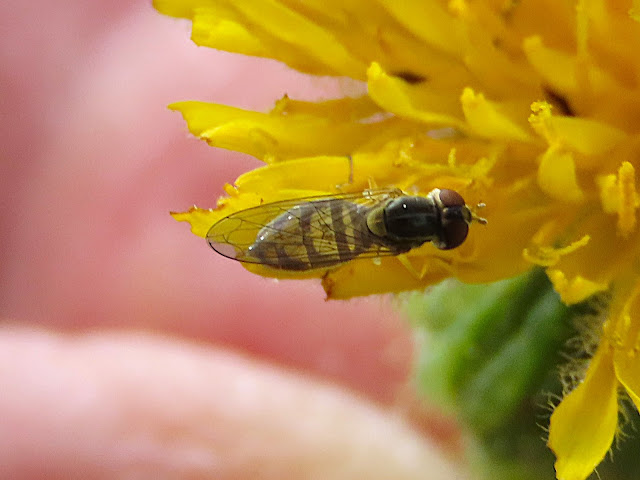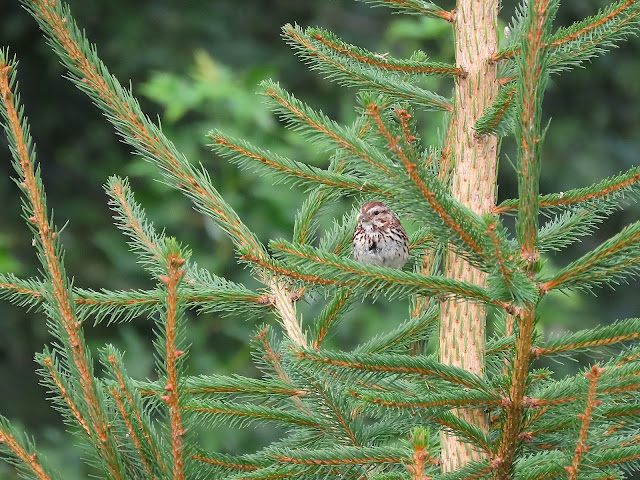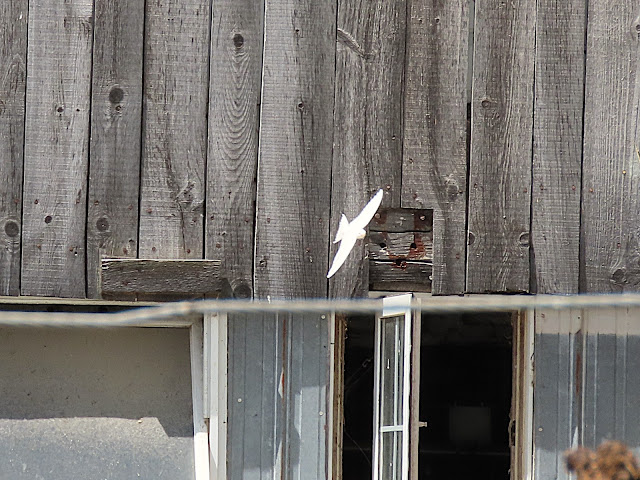My daughter, Caroline, was visiting for a few days and we went out each day to spend time in nature. It's the juice that flows through the blood of all of us!
We had not gone far when we came across an extraordinary, completely leucistic or albino Barn Swallow (Hirundo rustica).
The bird never landed so we were unable to determine the colour of the eye, but it flew strongly and associated with the other swallows of normal colouration.
The pictures are, of course, not terrific, but you will appreciate that the bird was flying at top speed, twisting and turning to snag insects, sometimes low to the ground, sometimes soaring skyward. The best technique to get a picture was to point the camera and click when the bird flew into the field of vision.
In an entire lifetime of birding I have never seen this before. We will come back to it at the end of this post.
Not long after the exhilaration of the swallow we came across a family of Eastern Bluebirds (Sialis sialia).
A Jagged Ambush Bush (Phymata americana) is a proficient assassin of other insects, but perhaps an opportunistic bluebird might prey on it, given the chance.
We were of the firm belief that the Red-headed Woodpecker (Melanerpes erythrocephalus) we had discovered just a week earlier was on a breeding territory, and we returned to verify our conclusion and to show the bird to Caroline.
Almost without delay we found the bird again, flying back and forth into the same area of the same woodlot, bona fide evidence of a nest, and probably already feeding young.
A striking Spotted Cucumber Beetle (Diabrotica undecimpunctata pleased us greatly.
A Margined Calligrapher (Toxomerus marginatus) is attractive and endearing, and a great friend in the garden where it consumes several harmful insects bent on feeding on your flowers and vegetables.
I had promised my good friend Carola that I would let her know the reason for naming the fly calligrapher, and I confess to having forgotten until now. It refers to the fine black edging on their abdomens, evoking calligraphy to some early taxonomist I suppose. I have no doubt that Carola will forgive my lapse of memory.
The following bird is probably a Willow Flycatcher (Empidonax traillii), but it could equally be an Alder Flycatcher (E. alnorum).
A Song Sparrow (Melopsiza melodia), singing or not, leaves no doubt as to its identity.
A Hickory Tussock Moth (Lophocampa caryae) caterpillar dangled on a strand of silk, perhaps waiting to be caught on a gust of wind and transported afar.
After all, this is not something you see every day!





























It looks like yet another delightful outing - even without the excitement of the leucistic barn swallow.
ReplyDeleteHi David - what an amazing 'spot' ... a ghostly bird ... I've never seen an albino bird, but a few with leucistic features. Beautiful photos ... as I imagine your few days with Caroline visiting must have made your days and outings an extra pleasure. Cheers Hilary
ReplyDeleteMiriam's header is a delight to see ... thank you!!
DeleteCaroline and Miriam have a great time together; they both tolerate me!
DeleteFancy seeing the albino barn swallow, came upon you both unexpectedly. Nice shots.
ReplyDeleteWhat an extraordinary bird! I lived and worked for years on a farm where there were hundreds of swallows around every summer - attracted by the flies from the farm muck-heap I presume - but I've never seen such a thing. Checking up online I see that there are sightings of albino or leucistic swallows every few years. All of them have occurred in late August/September, which suggests that they are that summer's fledglings, so they probably don't survive long after the parents stop feeding them. I did once have a leucistic Blackbird that appeared to follow me; I saw what I presume was the same bird in three separate locations on three different days. I'm sure a more superstitious person would have thought he was being haunted by some kind of spirit from the underworld!
ReplyDeletePeople did have a way of ascribing metaphysical qualities to unusual manifestations of nature - not even unusual in fact, events as simply as a crow perching on your roof.
Delete...few things escape your notice!
ReplyDeleteWe try to be observant.
DeleteGreat outing and photos! The white swallow is beautiful. Take care, enjoy your day!
ReplyDeleteThe albino swallow! What a sight to see!! :)
ReplyDeleteIt was incredible.
DeleteAlways happy to see the bluebirds! That Spotted Cucumber Beetle looks stunning.
ReplyDeleteThe white swallow is very beautiful and special, David. It must be very fun to watch it for you and your family. I love to see the Song Sparrow too. The sparrows are so cute.
ReplyDeleteHugs and kisses, Marit
What a great sighting of that swallow! I can only imagine how thrilled you all were! To capture photos of swallows in flight is above my ability.
ReplyDeleteLuck plays a major role, Marie.
DeleteThat white swallow is amazing. Did you have to take a second look at it just to be sure what you saw is what it was? And I just had some bluebird fledglings at my feeder the other day and I wasn't quite sure what they were. I didn't expect they'd be so brown. But now I know. Very cool swallow. I bet you'll be off to see it again. I would. Have a great day!
ReplyDeleteI did indeed and we have no doubt about its identity. Three people, with varying degrees of expertise, but all knowledgeable concurred.
DeleteAnd thanks for leaving the comment you did on my blog. I read it and went back to my post. I don't know what I was thinking when I wrote my post. The section about Captain Mortgage didn't even make sense to me so I switched it up. grin!
ReplyDeleteHari OM
ReplyDeleteThat was a truly special sighting, and to see it with family adds to the ceremony of it, one feels! YAM x
Miriam would nearly always be with me, but to have Caroline there too made it extra special.
DeleteBeautiful to see this albino barn swallow.
ReplyDeleteI have never seen this before either.
The other birds and flowers are also beautiful David.
I wish you a beautiful Wednesday.
Greetings Irma
Hi, David, you may remember that last year on my blog I showed you the offshore structure built for nesting Kittiwakes. I just read this;
ReplyDeletehttps://hornseaproject3.co.uk/news/2024/08/first-kittiwake-chick-hatches-at-orsted-artificial-nesting-site
A small, but encouraging step for this project.
Thanks, John. Let me go and check this out.
DeleteWhat a great success story and it would seem to augur well for the future. Great work being done here. We need a good news story now and then!
DeleteIsn't that something? I can imagine your excitement at seeing the white swallow.
ReplyDeleteA white swallow? It's amazing that such a bird exists.
ReplyDeleteI am enchanted by the beautiful Sialis sialia.
David, your photos always bring us so much joy and pleasure.
Sending Miriam and you lots of love.
No woodpeckers in Hawaii, which may be a good thing. Protect our trees!
ReplyDeleteProtect them? Humans have done a great job destroying them. A team of dedicated woodpeckers would take years to seriously harm a tree, and even then it has a life beyond leaf loss and external decay as it restores nutrients to the soil. A chainsaw kills a tree in a matter of minutes and nothing is returned.
DeleteWell, I am sure trees had to be cut down to build your house.
DeleteAnd they probably clearcut and destroyed a forest to get the wood. There are better ways…….
DeleteNice shots! My favourite is the Red-headed Woodpecker.
ReplyDeleteIt is a very handsome bird, and rare here.
DeleteRemarkable find! I wonder if it would be of interest to a recording organization like Cornell. That is, before it becomes too-easy prey for a keen-eyed hunting bird.
ReplyDeletebest, mae at maefood.blogspot.com
I haven’t seen it for a few days, Mae, but Barn Swallows are already migrating, so it may simply have left. When you refer to a “recording organization” do you mean record-keeping, or sound recording? This sighting has been posted to iNaturalist and I am sure that Cornell will pick it up from that source.
DeleteI can't recall that I have ever seen an albino or leucistic bird of any kind. That swallow is indeed a striking and memorable bird. One for the books!
ReplyDeleteI have never seen an albino bird, but I have seen leucistic birds of various species, American Robin being the most frequently seen.
DeleteHow thrilling to see the albino barn swallow! such a pure white.
ReplyDeleteGreat that your love of nature was passed on to your daughter. I am hoping the same will happen with mine too, she is nearly 6. Great you saw the swallow. It always makes me so happy to see something new and even better to get a good photo. These are great birds and loving the little beetle. That caterpillar is just fantastic too :-D
ReplyDeleteWhen my daughter was six she was already coming on nature walks with me, and learning at a voracious rate. Back then smart phones were not a distraction either.
DeleteEn buena compañía, has hecho esta gran excursión.
ReplyDeleteMagníficas fotografías.
Seeing that white swallow is a true gift from nature, isn't it? And those little bluebirds...so cute:)
ReplyDeleteIndeed it is, Sandra.
DeleteThat must have been very exciting to see the albino swallow, David. I hadn't even thought that there are albino birds, but why shouldn't there? It was just not thinking it through on my part. The Red-headed woodpecker is so delightful! Thank you for telling me about the Calligrapher and where the name comes from - I can relate to that explanation! I did a little research to see the abdomen of the insect, but unfortunately wasn't successful. But I'm glad that I now know how this name came into existence.
ReplyDeleteI bet you enjoyed the time with your daughter. I have to wait another seven weeks to see mine, and I almost can't wait. Hugs - Carola
Have a great time with your daughter, Carola. I know you will.
DeleteGreat find, the albino. I must also thank you for the new header; the goldfinch is one of my favorites.
ReplyDeleteThe white swallow!! What a special sighting. I bet your daughter was as amazed as you were.
ReplyDeleteI have only ever seen two or three red-headed woodpeckers. I think they are so striking.
Red-headed Woodpecker is a rare breeding species here.
DeleteThe white swallow is magnificent. I'm so glad you (finally!) had a new bird experience. And the cucumber beetle is so handsome. Best of all, you shared this with Caroline!
ReplyDeleteOh my! The white swallow is incredible. It almost looks like a paper cut out.
ReplyDeleteThat is a remarkable bird - I wonder if it's a bird of the year, or an older bird? Certainly worth looking for at local nest sites next year!
ReplyDeleteCheers - Stewart M - Melbourne
I would be virtually sure that it is a hatch year bird. This is a site we pass all the time and sometimes even stop to buy produce there (it’s a Mennonite farm) and if it were an adult bird that had migrated the previous year and returned to the area it defies belief that neither we, nor anyone else, would have spotted it before.
DeleteAn incredible bird. It hasn't been seen here in Finland either. This summer, the leucistic wagtail has been seen.
ReplyDeleteAmazing swallow ! Unique and so beautiful !
ReplyDeleteBeautiful too are your pictures David !
Thanks for sharing !
Have a shinny day !
Anna
Always a delightful education David! Lovely that your daughter is visiting. You all saw splendid sightings that I appreciated too. Thank you so much for sharing them.
ReplyDeletewhat a wonderful sighting. Will you return to watch for it again?
ReplyDeleteWe have not seen it recently, but Barn Swallows are already into migration so it may have left. We will be checking closely next spring to see if it returns.
DeleteI like that Spotted cucumber beetle, very attractive and useful as well so it seems. Wow that albino swallow is quite a sighting and you have a good record of having seen it, well done.
ReplyDeleteI am sure you both enjoyed having Caroline at home for a few days.
Take care, bisous mon ami, Diane
You changed your header!!! Love the new one but will miss you two.. If had had warning, I would have saved the old one.I especially like the appearance of thistle sticking out of the gold finches head. Is that just behind it? Nice picture..
ReplyDeleteI'm glad that you had a good time with your daughter. it's so nice that you have common interests.
Bluebirds are always a fun find.
We have partially leucistic birds here quite often but I have never seen a purely white one. I wonder if it was an albino. We have albino squirrels here. I haven't seen them this year but I have heard that they are around.
Another beautiful day spent in the arms of nature.
xxoo
As best I recall, I have never seen an albino bird. I have seen many birds showing leucism in varying degrees, and one pure white American Robin, clearly leucistic, however, and not albino. As far as I can tell, the birds don’t seem to be disadvantaged by it, although they may well be a more visible target for predators.
DeleteHi David, late but i arrived!!! what a beautiful post, it's poetic! nature has given you moments of pure wonder, like a swallow that defies the ordinary and flies in the air with the grace of a sigh. You and Caroline not only walked on the earth, but you also flew in the flight of those magical birds.ೄྀ࿐ ˊˎ-ೄྀ࿐ ˊˎ-
ReplyDeleteGreetings, dear friend. Have a beautiful night.
Gros bisous!
Hello David,
ReplyDeletethe white swallow is definitely an eye-catcher in the sky, seeing something like that is quite an experience, here in my area there was once a white deer, from a distance I thought it was an alpaca because it looked so unusual, but you can see from the photos that it is a deer. A freak of nature, say the hunters, Wikipedia says it is a genetic defect because the pigment melanin is not or hardly produced.
Whatever it is, it is always beautiful to look at..
Greetings Frank
I'm so glad you got to spend some happy time with your daughter and that you all got to see the white swallow together makes it even more special!
ReplyDeleteIndeed it does, Shari.
DeleteHi David. I'm responding to your comment on my blog, today Friday August 30. Yes, I took that photo in NH. I was at the botanical gardens in Lee (NH) when I took it. I'll have to look into reporting it. Thanks for the update. I don't think I'd ever seen one of these before myself which was what attracted me to taking the photo int he first place. Have a great weekend. hugs-Erika
ReplyDeleteMuy felices con vuestra hija, nos alegran cuando nos vidsitan. Que buen avistamiento de esa rara golondrina. Preciosas fotos David
ReplyDeleteQue tengáis un buen final de agosto y entrada de septiembre.
Un abrazo.
The white swallow is a rarity.
ReplyDeleteHi David,
ReplyDeleteWow, that white Swallow is really curious. A fantastic find!
Lovely Red-headed woodpecker! and cute the little Eastern Bluebirds!
Happy weekend, Regards, Maria
Biała jaskółka jest niezwykła. Widziałam kiedyś białego szpaka w stadzie. Mogłam oglądać ta białą plamkę bez końca. Piękne nowe zdjcie w nagłówku, choć Wasze wspólne zdjęcie bardzo mi się podobało. To niezwykłe mieć tak wiernego towarzysza w pasji.
ReplyDeleteMaybe in the future we'll change it for another picture of the two of us.
DeleteDear David,
ReplyDeletePhotographing swallows in flight is almost impossible, so you have already performed half a miracle. The other half of the miracle is the fascinating white swallow itself - breathtaking! The other animals can't quite compare to that, but you still managed to make several particularly beautiful sightings - for example the red-headed woodpecker, which lives up to its name. The willow or alder flycatcher was obviously having fun keeping you in the dark.
...
You are of courseright with what you wrote to me about the 300 million NZ$ that, according to the newspaper article, are to be used to restore the church in Christchurch. I also think that this amount could really do something to make the world a little better or healthier. But since the church was considered an important landmark of Christchurch, the symbolic character may be important for the people of the city... (I'm not a religious person, but I think that if St. Stephen's Cathedral were destroyed in Vienna, that would also be an important symbolic step in reconstruction. It was the same after WWII... It seems to give people courage, regardless of whether they go to church or not... May be that's the reason why...)
All the best and have a nice weekend, Traude
https://rostrose.blogspot.com/2024/08/kelten-katzen-und-mehr-sommer.html
I think there is a lot of truth to what you say, Traude. I think the whole world wanted Notre Dame de Paris rebuilt after it burned a few years ago. Some structures are the patrimony of people beyond the country in which they are located.
DeleteThat certainly was a good outing.
ReplyDeleteI enjoyed seeing all of the photographs, especially the white swallow.
All the best Jan
Maravillosos avistamientos, la golondrina albina me ha gustado mucho. Abrazos.
ReplyDelete